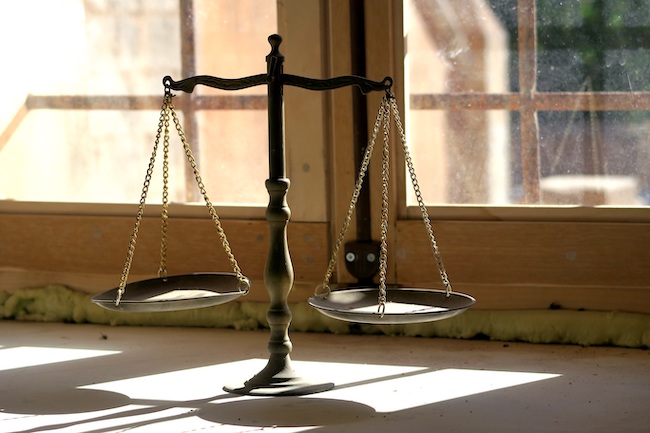
The birth of Moshe, in last week’s parsha, concerned Shevet Levi. “A man from the house of Levi married a daughter of Levi…” At first, the Torah didn’t even name Moshe’s parents — simply, they came from the house of Levi.
In this week’s parsha, the Torah gives the genealogy of Moshe and Aharon. It is very important that the Torah stresses the shevet Levi.
As we saw in previous parshiyos, Levi was active against injustice. When the people of Shechem sinned, Shimon and Levi went to battle. Again, Shimon and Levi sought to punish Yoseif for his perceived crimes. Although Yaakov Avinu was very upset with them, Levi is the advocate for justice. Moshe — the Giver of the Torah — represents din; he is there to realign, reconform and establish proper dinim. As we discussed earlier — Levi would be assigned to guard the arei miklat — the cities of refuge for people who accidentally killed. So, too, at the incident of the Eigel (Golden Calf), Moshe calls for troops. Who comes to the rescue? The entire shevet Levi.
In the first story of Moshe, when he was still a young boy, he is already seeking justice. Seeing an Egyptian striking a Jew in an attempt to kill, Moshe attacks the pursuer, killing him. The next day, two brothers are fighting — with murderous intent. One of them is Doson, the Jew who was saved from the Egyptian (Rashi).
Moshe asks, “Why are you smiting your friend?” To which Doson responds: “Who made you officer and judge over us? Are you saying you’re going to kill me, as you killed the Egyptian?”
Doson’s intent seems to be as follows: “What allows you to judge? Are you comparing me to the Egyptian? You interfered and killed someone yesterday, are you going to repeat this act and kill me today for fighting with my brother?”
He meant that presumably Moshe would wait for Doson to kill his brother, then have him tried and convicted for murder. Therefore, he asked, “Who made you an officer of the king, or a judge of the Beis Din, that you would have such authority?” (The Brisker Rav).
Why not stop him before he commits the murder? At this point, Doson should have the status of rodeif (pursuer), who can be killed in order to prevent murder… The Siach Dovid answers: As far as the law of rodeif is concerned, it remains to be seen who is pursuing whom… perhaps Doson is killing his brother in self-defence. Therefore, Doson claimed that Moshe was waiting for the killing to take place — then he would convene his court and determine whether the crime of murder had indeed taken place.
In reality, was there any basis in comparing these two episodes? Moshe merely asked why Doson was striking his brother. Did Moshe want to execute anyone? It is not even clear that Moshe had intended to kill the Egyptian the previous day!
In Medrash Rabba 2, an opinion is cited that Moshe killed the Egyptian accidentally (Kol Torah). This is also the opinion of the Ari z”l (Sha’ar Hamitzvos, Shoftim). Both these sources explain that Moshe had to flee in order to fulfill the mitzva of galus (exile) for an unintentional killing.
A similar discussion concerns a third party who attempts to stop a rodeif: It was possible to wound the pursuer, but the third party deliberately killed him. One opinion says that the third party is culpable of the death penalty (Sanhedrin 74a). This is the view of the Rambam (see 1) and the Rivash (Simon 473).
Similarly, the view of the Medrash Rabba and the Ari z”l cited above: Although Moshe was saving the Jew, in error he killed the Egyptian, although it was sufficient to wound him; for this error, Moshe needed the atonement of galus.
The Need for the Galus of Mitzraim
Once Doson accused Moshe of killing the Egyptian, Moshe realized that the brothers would report him to the authorities, which indeed happened. At that point, Moshe felt that he had a grasp as why the Jews were enslaved: their hazardous manner of speaking about.
Spies and Informers are not merely the stuff of espionage and intelligence services. They are everywhere! How often does it happen that a customer doesn’t like an employee’s behavior and relates his displeasure to the manager? Every day. What has not been anticipated is that the manager himself is upset — his reputation is in jeopardy. The chances of his speaking insensitively to the worker is great. Many times, a worker is fired — on the spot — on the basis of one complaint! It’s a daily occurrence that someone is publicly shamed because of a single complaint.
As we wrote a few weeks ago, Yaakov Avinu did nothing when Yoseif gave him bad report about the brothers; he didn’t accept the report (The Chofetz Chaim). At the very least, the employee should be given an opportunity to defend himself.
1. Hilchos Rotze’ach (1:13). The Rambam is of the opinion that the death penalty here is not by the beis din, rather through the heavenly court (misa bidei shomayim).


